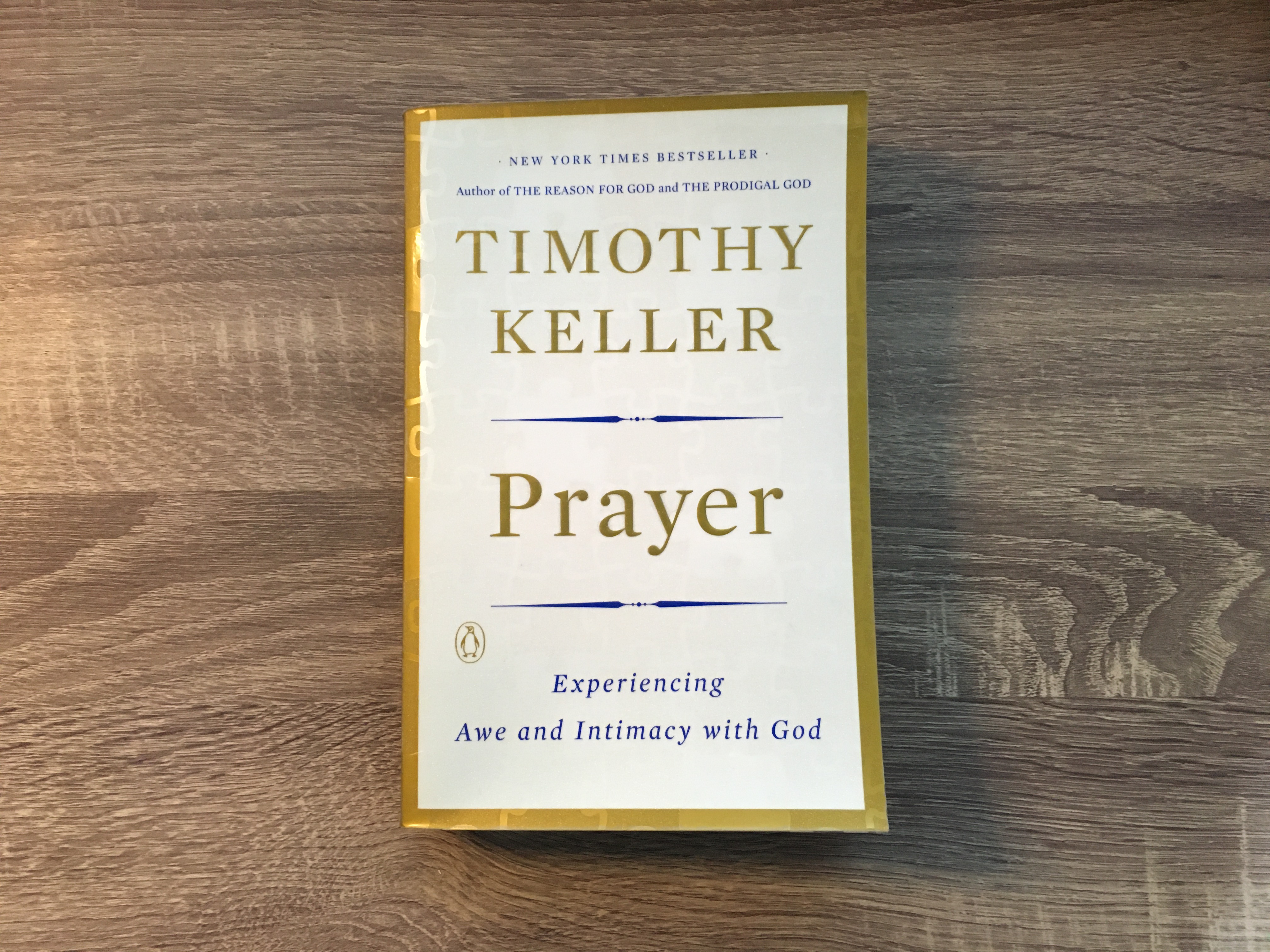I almost always write long and that makes it difficult to post consistently. Oftentimes, my writing process involves contemplating on a single idea and then constructing a simple outline. But then when I write the content, more often than not it exceeds 1000 words, which is counter-cultural. Today, we want to get information fast. We want tweetable content without having to wrestle for a 15-minute reading. It’s one of the downsides of our generation. We may have everything at our fingertips, but we do not have enough patience to digest information.
To have some sort of compromise with our culture, I thought of writing short book reviews. Well, hopefully, it would really be short.
I’m starting with Tim Keller’s book, Prayer: Experiencing Awe and Intimacy with God. On my Goodreads account, I rated this book 4/5 stars and yet it’s the first book that came to mind when I thought of doing a book review. In a nutshell, I both hate and love it.
Okay, let me elaborate that. I don’t particularly like it for unjustifiable reasons, haha. It’s just my pet peeve. The reason being Keller’s writing which felt to me that I am not reading Keller, but that he was just echoing what the saints1 of old were teaching including Augustine, Martin Luther and John Calvin, among others. This is not preferable to people like me who are exposed to reading them. Why read it from Keller if I can read directly from Calvin’s Institutes?
But then, this is also the book’s strength. Call me biased, but I think the saints of old are more serious with their spiritual disciplines compared to our generation. If you are someone seriously considering improving your habit of prayer but do not read old books, this is perfect for you.
Application
Now instead of summarizing its content, I think it would be more fitting to write about what changed in my personal prayer life as a result of reading this book. Spoiler alert!
-
Pray the Scriptures. Also an advice of John Piper, I became more intentional in quoting Scriptures in prayer. This makes sense since we are commanded to pray according to God’s will (1 John 5.14-15). And the Word of God is his revealed will. Practically, this would be as simple as praying, “Holy Spirit, teach me your ways; rebuke and correct me; train me in righteousness” (2 Timothy 3.16-17). But then this necessitates that we know the Scriptures. Indeed, prayer and reading God’s word go hand-in-hand.
-
Pray to the Trinity. There is no other god like the Christian God 2, the Trinitarian God. While our God is one in being, God is also three persons: Father, Son and Spirit. Each person of the Trinity has his own functions which can be generalized as the Father planning, the Son accomplishing and the Holy Spirit consummating. Hence, we should pray according to this economy. We pray primarily to the Father as is taught by the Lord in his famous prayer (Matthew 6.8-13). We praise the Son for his life, death and resurrection. We ask the Holy Spirit to sanctify us, keeping us away from sin and producing in us his fruit (Galatians 5.22-24).
-
Pray the Psalms. I was always curious with the Anglican Psalter, a book comprised of Psalms intended for personal and family devotion. Today, I open my quiet time with a Psalm, meditating on it and then using it as the spring board for meditation and “freestyle” prayer.
-
Meditate. I try not to pray empty repetitive prayers that qualify as Pharisaical babbling. Rather, as I read the Bible, I reflect of my sins related to the passage and confess them to God. I praise God together with the psalmist, or present my petitions related to the biblical text to God. Martin Luther comes strong with this. He regularly used the Ten Commandments for prayer, a practice that Lutherans adapt until today.
-
Pray twice a day. Now this is something that comes from Keller’s own practice. It is common for faithful Christians to pray once a day in their quiet time, oftentimes in the morning. But Keller practiced praying in the night also together with his wife, and I plan to do the same if God would allow me to be married. But of course, I already am applying it today alone.
-
Read Augustine’s Confessions. As part of my evening prayer, I read a short chapter from Augustine’s Confessions and then use it as a spring board for prayer, similar with my use of Psalms. Of course, this book is not infallible but I find his reflections deeply thought-provoking that encourages me to reflect with my life as well.
Quotes
Since I promised writing below 1000 words,3 I have to end this shortly. But maybe the best way to close this is by quoting the book itself:
“In the summer after I was treated successfully for thyroid cancer, I made four practical changes to my life of private devotion. First, I took several months to go through the Psalms, summarizing each one. That enabled me to begin praying through the Psalms regularly, getting through all of them several times a year. The second thing I did was always to put in a time of meditation as a transitional discipline between my Bible reading and my time of prayer. Third, I did all I could to pray morning and evening rather than only in the morning. Fourth, I began praying with greater expectation.” p. 17
“A minister may fill his pews, his communion roll, the mouths of the public, but what that minister is on his knees in secret before God Almighty, that he is and no more (John Owen).” p. 22
“To fail to pray, then, is not to merely break some religious rule—it is a failure to treat God as God. It is a sin against his glory.” p. 26
“The clearer our understanding of who God is, the better our prayers.” p. 46
“Martin Luther was adamant that we must never get “beyond” God’s words in the Bible or we can’t know whom we are conversing with. “We must first hear the Word, and then afterwards the Holy Ghost works in our hearts; he works in the hearts of whom he will, and how he will, but never without the Word.”” p. 57
“…if we have made God our greatest love, and if knowing and pleasing him is our highest pleasure, it transforms both what and how we pray for a happy life.” p. 86
“…God often waits to give a blessing until you have prayed for it. Why? Good things that we do not ask for will usually be interpreted by our hearts as the fruit of our own wisdom and diligence.” p. 102
“Prayer and helplessness are inseparable (Ole Hallesby).” p. 128
“According to Owen, meditation means analyzing the truth with the mind; bringing it into the feelings, attitudes, and commitments of the heart; and then responding to the degree to which the Holy Spirit gives illumination and spiritual reality.” p. 162
“The apostle John writes that if we confess our sins, God is “faithful and just and will forgive us our sins” (1 John 1:9). It doesn’t say that if we confess our sins, God forgives because he is merciful (though that is, of course, also true). It says he forgives when we confess because he is just. In other words, it would be unjust of God to deny us forgiveness because Jesus earned our acceptance, as John goes on to immediately point out. “If anybody does sin, we have an advocate with the Father—Jesus Christ, the Righteous One. He is the atoning sacrifice for our sins” (1 John 2:1–2a). All those who are in Christ must and will be forgiven. Why? He has taken the punishment and paid the debt for all their sins. It would be unjust of God—and unfaithful to his covenant with us—to receive two payments on the same debt, so it would be unjust for him not to forgive us. This profound assurance and security transforms repentance from being a means of atoning for sin into a means of honoring God and realigning our lives with him.” p. 209
Footnotes
-
I don’t mean saints in the Roman Catholic sense, but rather saints of the New Testament sense, the believers. See Ephesians 1.1. ↩
-
Well of course, the so-called ‘gods’ of other religions do not really exist. But my point is, the doctrine of the Trinity is unique to Christianity, which separates us even from the Jews. ↩
-
Below 1000 words, excluding the quotes, that is. ↩


Comments